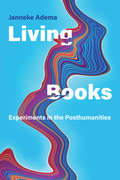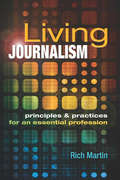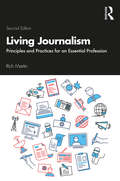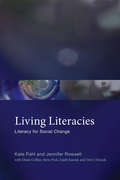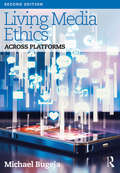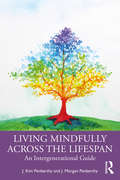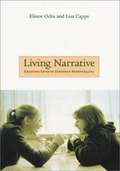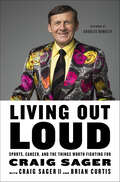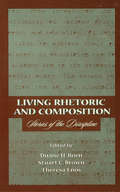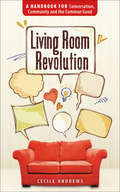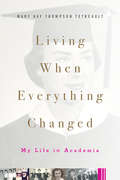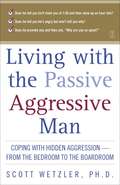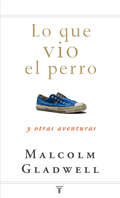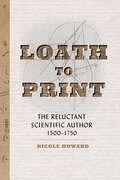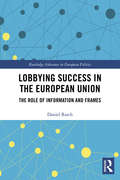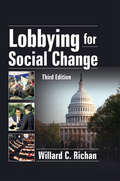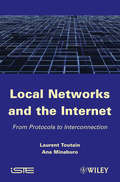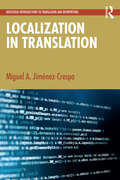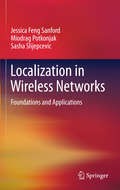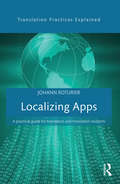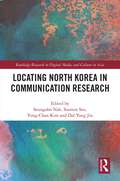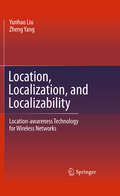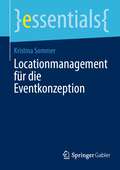- Table View
- List View
Living Books: Experiments in the Posthumanities (Leonardo)
by Janneke AdemaReimagining the scholarly book as living and collaborative--not as commodified and essentialized, but in all its dynamic materiality.In this book, Janneke Adema proposes that we reimagine the scholarly book as a living and collaborative project--not as linear, bound, and fixed, but as fluid, remixed, and liquid, a space for experimentation. She presents a series of cutting-edge experiments in arts and humanities book publishing, showcasing the radical new forms that book-based scholarly work might take in the digital age. Adema's proposed alternative futures for the scholarly book go beyond such print-based assumptions as fixity, stability, the single author, originality, and copyright, reaching instead for a dynamic and emergent materiality. Adema suggests ways to unbind the book, describing experiments in scholarly book publishing with new forms of anonymous collaborative authorship, radical open access publishing, and processual, living, and remixed publications, among other practices. She doesn't cast digital as the solution and print as the problem; the problem in scholarly publishing, she argues, is not print itself, but the way print has been commodified and essentialized. Adema explores alternative, more ethical models of authorship; constructs an alternative genealogy of openness; and examines opportunities for intervention in current cultures of knowledge production. Finally, asking why it is that we cut and bind our research together at all, she examines two book publishing projects that experiment with remix and reuse and try to rethink and reperform the book-apparatus by taking responsibility for the cuts they make.
Living Journalism: Principles & Practices for an Essential Profession
by Rich MartinFor journalism to survive and flourish, it needs journalists who understand its importance to society, believe in and are committed to its core values, and can put those values into action. This goal is at the heart of Living Journalism, a highly readable, practical book where readers will learn the core values and principles needed to produce work that informs and enlightens an increasingly mobile and participatory audience. The advice and stories of professionals throughout the book allow veteran reporters to serve as mentors to today's journalists.
Living Journalism: Principles and Practices for an Essential Profession
by Rich MartinIn this readable, practical textbook Rich Martin explores the core principles and practices that beginning journalists need to produce work that informs and enlightens citizens hungry for accurate and trustworthy news. The textbook’s 16 concise chapters impart real-world examples demonstrating how the best journalists exemplify the key principles, as well as cautionary stories illustrating journalistic mistakes and missteps. It also contains exercises, checklists, tips and additional resources that students can use in class and independent study, making the book an ideal newsroom and classroom resource that can be returned to again and again for new insights. For journalism to survive and flourish in the 21st century, it needs young practitioners who understand its importance to society, believe in and are committed to its core values, and can put those values into action. This new edition of Living Journalism is an excellent updated introduction to journalism for students, teachers and young professionals.
Living Literacies: Literacy for Social Change
by Jennifer Rowsell Kate PahlAn approach to literacy that understands it as lived and experienced in the everyday across varied spaces and populations.This book approaches literacy as lived and experienced in the everyday. A living literacies approach draws not only on such official, schooled activities as reading, writing, speaking, and listening but also on such routine, tacit activities as scrolling through Instagram, watching news footage, and listening to music. It goes beyond well-worn framings of literacy as an object of study to reimagine literacy as constantly in motion, vital, and dynamic, filled with affective intensities.
Living Media Ethics: Across Platforms
by Michael BugejaWinner of the Clifford G. Christians Award for Research in Media Ethics, Michael Bugeja’s Living Media Ethics posits that moral convergence is essential to address the complex issues of our high-tech media environment. As such the book departs from and yet complements traditional pedagogy in media ethics. Bugeja covers advertising, public relations and major branches of journalism, as well as major schools of philosophical thought and historical events that have shaped current media practices. Examining topics including responsibility, truth, falsehood, temptation, bias, fairness, and power, chapters encourage readers to develop a personal code of ethics that they can turn to throughout their careers. Each chapter includes exercises, as well as journal writing and creative assignments, designed to build, test, and enhance individual value systems. Unlike other texts, this media ethics book ends with an assignment to create a digital portfolio with personal ethics code aligned with a desired media position or company.
Living Mindfully Across the Lifespan: An Intergenerational Guide
by J. Kim Penberthy J. Morgan PenberthyLiving Mindfully Across the Lifespan: An Intergenerational Guide provides user-friendly, empirically supported information about and answers to some of the most frequently encountered questions and dilemmas of human living, interactions, and emotions. With a mix of empirical data, humor, and personal insight, each chapter introduces the reader to a significant topic or question, including self-worth, anxiety, depression, relationships, personal development, loss, and death. Along with exercises that clients and therapists can use in daily practice, chapters feature personal stories and case studies, interwoven throughout with the authors’ unique intergenerational perspectives. Compassionate, engaging writing is balanced with a straightforward presentation of research data and practical strategies to help address issues via psychological, behavioral, contemplative, and movement-oriented exercises. Readers will learn how to look deeply at themselves and society, and to apply what has been learned over decades of research and clinical experience to enrich their lives and the lives of others.
Living Narrative: Creating Lives In Everyday Storytelling
by Elinor Ochs Lisa CappsThis work looks at everyday storytelling as a twofold phenomenon - a response to our desire for coherence, but also to our need to probe and acknowledge the enigmatic aspects of experience. Letting us listen in on dinner-table conversation, prayer, and gossip, Elinor Ochs and Lisa Capps develop a way of understanding the seemingly contradictory nature of everyday narrative - as a genre that is not necessarily homogeneous and as an activity that is not always consistent but consistently serves our need to create selves and communities. Focusing on the ways in which narrative is co-constructed, and on the variety of moral stances embodied in conversation, the authors draw out the instructive inconsistencies of these collaborative narratives, whose contents and ordering are subject to dispute, flux, and discovery. In an eloquent last chapter, written as Capps was waging her final battle with cancer, they turn to "unfinished narratives," those stories that will never have a comprehensible end.
Living Out Loud: Sports, Cancer, and the Things Worth Fighting For
by Brian Curtis Craig Sager Craig Sager IIThe beloved sportscaster recounts how he maintained a positive outlook on life in the face of battling leukemia in this moving and inspiring memoir.A New York Times Bestseller“Time is something that cannot be bought, it cannot be wagered with God, and it is not in endless supply. Time is simply how you live your life.” —Craig SagerThanks to an eccentric wardrobe filled with brightly colored suits and a love of sports that knows no bounds, Craig Sager is one of the most beloved and recognizable broadcasters on television. So when the sports world learned that he was diagnosed with acute myeloid leukemia (AML) there was an outpouring of love and support from everyone who was inspired by his colorful life and his fearless decision to continue doing the job he loved—despite being told that he would have only three-to-six months to live. Sager has undergone three stem cell transplants—with his son as the donor for two of them—and more than twenty chemotherapy cycles since his diagnosis.In Living Out Loud, Craig Sager shares incredible stories from his remarkable career and chronicles his heroic battle. Whether he’s sprinting across Wrigley Field mid-game as a college student with cops in pursuit, chasing down Hank Aaron on the field for an interview after Aaron broke Babe Ruth’s home run record, running with the bulls in Pamplona, or hunkering down to face the daunting physical challenges of fighting leukemia, Craig Sager is always ready to defy expectations, embrace life, and live it to the fullest.Including a foreword by Charles Barkley and with unique insight from his son Craig Sager II, this entertaining, honest, and introspective account of a life lived in sports reveals the enduring lessons Sager has learned throughout his career and reminds you that no matter what life throws at you, to always look at the bright side.
Living Rhetoric and Composition: Stories of the Discipline
by Stuart C. Brown Theresa Enos Duane H. RoenThis collection--of the stories of scholars who have found a lifelong commitment to the teaching of writing--includes the professional histories of 19 rhetoricians and compositionists who explain how they came to fall in love with the written word and with teaching. Their stories are filled with personal anecdotes--some funny, some touching, some m
Living Room Revolution: A Handbook for Conversation, Community and the Common Good
by Cecile AndrewsThe author of The Circle of Simplicity “joyfully invites us to discover a robust and real personal expansion with each other as we remake our society” (Mark Lakeman, cofounder, The City Repair Project).Every man for himself! For too long we have lived in a competitive, consumer-oriented culture, destroying the well-being of people and the planet. We believe that money brings happiness, yet all too often, the opposite is true. The pursuit of wealth at any cost corrupts our values and diminishes our lives. The resulting inequality breaks down social cohesion and generates envy, bitterness, and resentment. Greed breeds more greed.Living Room Revolution refutes the notion that selfishness is at the root of human nature. Research shows that people—given the right circumstances—can be caring, nurturing and collaborative. Presented with the opportunity, they gravitate toward actions and policies embodying empathy, fairness, and trust instead of competition, fear, and greed. The regeneration of social ties and the sense of caring and purpose that comes from creating community drive this essential transformation.At the heart of this movement is the ancient art of conversation. Living Room Revolution provides a practical toolkit of concrete strategies to facilitate personal and social change by bringing people together in community and conversation.The heart of happiness is joining with others in good talk and laughter. Each person can make a difference, and it can all start in your own living room!“Small groups. Study circles. Stop ’n chats. House parties. Movie nights. Online sharing. Bring people together, and you never know what kind of fuse you’ll ignite for change.” —Wanda Urbanska, author of The Heart of Simple Living
Living When Everything Changed: My Life in Academia
by Mary Kay TetreaultEntering the academy at the dawn of the women’s rights movement in the late 1960s and early 1970s, the first generation of feminist academics had a difficult journey. With few female role models, they had to forge their own path and prove that feminist scholarship was a legitimate enterprise. Later, when many of these scholars moved into administrative positions, hoping to reform the university system from within, they encountered entrenched hierarchies, bureaucracies, and old boys’ networks that made it difficult to put their feminist principles into practice. In this compelling memoir, Mary Kay Thompson Tetreault describes how a Catholic girl from small-town Nebraska discovered her callings as a feminist, as an academic, and as a university administrator. She recounts her experiences at three very different schools: the small progressive Lewis & Clark College, the massive regional university of Cal State Fullerton, and the rapidly expanding Portland State University. Reflecting on both her accomplishments and challenges, she considers just how much second-wave feminism has transformed academia and how much reform is still needed. With remarkable candor and compassion, Thompson Tetreault provides an intimate personal look at an era when both women’s lives and university culture changed for good. The Acknowledgments were inadvertently left out of the first printing of this book. We apologize for the oversight, and offer them here instead. Future printings will include this information. (https://d3tto5i5w9ogdd.cloudfront.net/wp-content/uploads/2019/08/29185420/Thompson-Tetreault-Acknowledgments.pdf)
Living Without the Screen: Causes and Consequences of Life without Television
by Marina KrcmarLiving Without the Screen provides an in-depth study of those American families and individuals who opt not to watch television, exploring the reasons behind their choices, discussing their beliefs about television, and examining the current role of television in the American family. Author Marina Krcmar answers several questions in the volume: What is television? Who are those people who reject it? What are their reasons for doing so? How do they believe their lives are different because of this choice? What impact does this choice have on media research? This volume provides a current, distinctive, and important look at how personal choices on media use are made, and how these choices reflect more broadly on media’s place in today’s society. A compelling exploration of the motivations and rationales for those who choose to live without television, this book is a must-read for scholars and researchers working in children and media, media literacy, sociology, family studies and related areas. It will also be of interest to anyone with questions about media usage and the choices families make regarding the role of media in their lives.
Living with the Passive-Aggressive Man
by Scott WetzlerDO YOU KNOW ONE OF THESE MEN? The catch-me-if-you-can lover... Phil's romantic and passionate one minute, distant and cold the next. The deviously manipulative coworker or boss... Jack denies resenting Nora's rapid rise in the company, but when they're assigned to work together on a project, he undermines her. The obstructionist, procrastinating husband... Bob keeps telling his wife he'll finish the painting job he began years ago, but he never seems to get around to it. These are all classic examples of the passive-aggressive man. This personality syndrome -- in which hostility wears a mask of passivity -- is currently the number one source of men's problems in relationships and on the job. In Living with the Passive-Aggressive Man, Scott Wetzler draws upon numerous case histories from his own practice to explain how and why the passive-aggressive man thinks, feels, and acts the way he does. Dr. Wetzler also offers advice on: How to avoid playing victim, manager, or rescuer to the "P-A" How to get his anger and fear into the open How to help the "P-A" become a better lover, husband, and father How to survive passive-aggressive game playing on the job Living with a man's passive aggression can be an emotional seesaw ride. But armed with this book, you can avoid the bumpy landings.
Lo que vio el perro: y otras aventuras
by Malcolm GladwellLos mejores reportajes del autor de los best sellers La clave del éxito y Fueras de serie. Sólo poniéndose en la piel de un perro, pensó Gladwell, podría destapar los secretos de César Millán, el «encantador de perros», capaz de calmar al animal más inquieto o enfurecido con un simple gesto. El ensayo que da título a este libro es un divertido y eficaz ejemplo del método gladwelliano, consistente en «mirar el problema con ojos ajenos». Gladwell nos trae historias de todos los rincones del mundo moderno: investiga las agridulces vidas de genios menores, audaces y obsesivos como el señor Heinz, responsable de que sólo exista un tipo de ketchup frente a docenas de variedades de mostaza; nos revela la trascendencia de la evolución del tinte capilar en la historia del siglo XX; compara los métodos de búsqueda de armas de destrucción masiva con los de detección del cáncer. Autor de tres best sellers que han dado un vuelco a nuestra manera de entender el mundo, Gladwell ha elegido los que consideraba sus mejores artículos, diseminados en distintos números de la mítica revista The New Yorker y nueva muestra de su insaciable curiosidad. Reseñas:«Un libro magnífico que reúne el estilo de escritura que ha hecho de Gladwell la extraordinaria figura que es hoy.»The Guardian «Gladwell es probablemente el mejor exponente de la reciente tendencia de libros que intentan revelarnos los secretos de nuestro complejo mundo a través del prisma de las ciencias sociales.»Financial Times «Algunos capítulos de Lo que vio el perro son obras maestras del arte del ensayo.»The New York Times «Malcolm Gladwell, escritor de éxito masivo, se ha convertido en uno de los grandes especialistas de nuestro tiempo en iluminar las zonas de sombra con su mezcla de periodismo, estudios científicos, historia y filosofía. Amante de llevar la contraria [...] Su objetivo es colocar junto a la certeza un signo de interrogación. [...] Gladwell define su trabajo como "no ficción pop". [...] Es un cheerleader de las ciencias sociales. [...] A la vista de los millones de lectores que han devorado sus libros, cabría decir que hay algo tranquilizador en ver ideas confirmadas por los estudios citados. También es curioso y seductor.»El País Semanal «Un mago en los libros de autoayuda. [...] Con más de 10 millones de ejemplares vendidos, Malcolm Gladwell es uno de los principales escritores "motivacionales", gurú del éxito y analista de "estrategias para triunfar". La clave del éxito, Inteligencia intuitiva, Lo que vio el perro y Fueras de serie son libros que ejecutivos y líderes de todo tipo devoran en los aeropuertos.»La Gaceta de los negocios
Loath to Print: The Reluctant Scientific Author, 1500–1750
by Nicole HowardWhy did so many early modern scientific authors dislike and distrust the printing press?While there is no denying the importance of the printing press to the scientific and medical advances of the early modern era, a closer look at authorial attitudes toward this technology refutes simplistic interpretations of how print was viewed at the time. Rather than embracing the press, scientific authors often disliked and distrusted it. In many cases, they sought to avoid putting their work into print altogether. In Loath to Print, Nicole Howard takes a fresh look at early modern printing technology from the perspective of the natural philosophers and physicians who relied on it to share ideas. She offers a new perspective on scientific publishing in the early modern period, one that turns the celebration of print on its head. Exploring both these scholars' attitudes and their strategies for navigating the publishing world, Howard argues that scientists had many concerns, including the potential for errors to be introduced into their works by printers, the prospect of having their work pirated, and most worrisome, the likelihood that their works would be misunderstood by an audience ill-prepared to negotiate the complexities of the ideas, particularly those that were mathematical or philosophical. Revealing how these concerns led authors in the sciences to develop strategies for controlling, circumventing, or altogether avoiding the broad readership that print afforded, Loath to Print explains how quickly a gap opened between those with scientific knowledge and a lay public—and how such a gap persists today. Scholars of the early modern period and the history of the book, as well as those interested in communication and technology studies, will find this an accessible and engaging look at the complexities of sharing scientific ideas in this rich period.
Lobbying Success in the European Union: The Role of Information and Frames (Routledge Advances in European Politics)
by Daniel RaschHaving information is key for most political decisions – both for decision-makers and societal actors. This is especially crucial in democratic countries where external stakeholders are invited to participate in decision-making pro- cesses. Assuming that every actor that gets involved in decision-making processes has a particular lobbying goal, there is a heterogeneous set of actors competing against each other to provide information to the decision-makers. This competition leads some stakeholders to be more successful in achieving their goals than others. Frames, and the framing of information, play an important role in such lobbying success. In this book, Daniel Rasch questions whether and, if so, how, information impacts lobbying success and shows how various actors perform in three instances of European decision-making. He does so by combining findings from a qualitative content analysis with the results of a cross-case analysis using the quantified qualitative data. The new dataset contains a representative sample of over 200 position papers from EU level and national consultations, press releases and evidence from national stakeholders in Germany, Sweden and the United Kingdom. Lobbying Success in the European Union effectively bridges research on interest mediation and framing studies, and offers a new model for measuring stakeholders’ success. This new and pragmatic approach to study lobbying success using a traceable and easy to use instrument can be adapted to any policy analysis and any issue.
Lobbying for Social Change
by Willard C. RichanThis step-by-step guide to lobbying covers it all-from the basics for beginners to specific techniques for experienced lobbyists"You and I may never achieve major public office, but we do not need to in order to affect public policy."-Author Willard C. RichanTo effect social change, any lobbyist&’s case must be presented with skill, knowledge, and confidence. This reader-friendly book shows the way. It assumes no prior knowledge of the subject and provides the nuts and bolts of public policy advocacy (lobbying) in non-technical language. Lobbying for Social Change, Third Edition is organized in a way that easily lends itself to use in the classroom as well as by individual or group advocates, and it is packed with clearly presented case material that illustrates the lobbying process in action. This new edition provides updated case material, expanded coverage of electronic media, and two new chapters; one focusing on direct action for fundamental change, and the other presenting a case history of a grassroots lobbying campaign.Part I of Lobbying for Social Change, Third Edition, entitled "The Basics," will show you how to: assess your political resources set an agenda for action understand whom to lobby-and how to gauge their power, motivation, and ability to effect or impede social change gather and use evidence to support your positionPart II, "Practical Applications," gives you nuts-and-bolts information about how lobbying is done. You&’ll learn: how to work directly with policymakers-face-to-face, by mail, by telephone, etc. effective rules for to testifying in a public hearing how to make use of the mass media-writing news releases, participating in panel discussions, what to do when being interviewed (and how to increase your chances of being a repeat guest on talk and news shows), and how to effectively work with print and electronic media, including the Internet ways to take on the system through direct actionPart III, "Case History of a Grassroots Lobbying Campaign," takes you inside an actual campaign (in this case, to amend the impending-at the time-welfare reform bill). You&’ll see how a group of five Philadelphia area social workers and one feminist activist started the Delaware County Coalition to Save Our Safety Net-a coalition that would make a substantial impact on the specifics of welfare in the state of Pennsylvania.This new edition of the classic manual for lobbyists is packed with vital information for lobbying in the new millennium. We urge you to consider making it a part of your personal or teaching collection today!
Local Journalism and Local Media: Making the Local News
by Bob FranklinThe local media - local newspapers and radio, regional television, cable television and local news on the internet - represents a diverse and rapidly-changing sector of the British media landscape. Bringing together media academics, local journalists and other media professionals, this text presents a thorough, up-to-date and authoritative account of recent developments and future prospects for Britain's local newspapers, local media and local journalism. Drawing on current research and relevant literature, the book covers: *key developments in the local media scene*the distinctive editorial format of local newspapers*news sources and other sources available to local journalists*recent developments in media policy*online journalism*ethics and regulations*the impact of new technology. Situating the study within the context of local, national and multi-national media networks, this unique text provides students with a well-written and wide-ranging assessment of all aspects of the local media in the UK and as such, will be a welcome addition to the current literature.
Local Networks and the Internet: From Protocols to Interconnection (Wiley-iste Ser.)
by Laurent Toutain Ana MinaburoThis title covers the most commonly used elements of Internet and Intranet technology and their development. It details the latest developments in research and covers new themes such as IP6, MPLS, and IS-IS routing, as well as explaining the function of standardization committees such as IETF, IEEE, and UIT. The book is illustrated with numerous examples and applications which will help the reader to place protocols in their proper context.
Localization in Translation (Routledge Introductions to Translation and Interpreting)
by Miguel A. Jiménez-CrespoLocalization is everywhere in our digital world, from apps to websites or games. Our interconnected digital world functions in part thanks to invisible localization processes that allow global users to engage with all sorts of digital content and products. This textbook presents a comprehensive overview of the main theoretical, practical, and methodological issues related to localization, the technological, textual, communicative, and cognitive process by which interactive digital texts are prepared to be used in contexts other than those of production.Localization in Translation provides an interdisciplinary introduction to the main practical and theoretical issues involved in localizing software, web, video games, and apps. It discusses the many technological, cultural, linguistic, quality, economic, accessibility, and user-reception issues related to the different localization types. It also provides an updated overview of localization in an ever-changing technological landscape marked by advances in neural machine translation and AI. Each chapter includes a basic summary, key questions, a final section with discussion and assignments, as well as additional readings. Online resources with additional questions and assignments are included on the Routledge Translation Studies portal.This is the essential textbook for advanced undergraduates and graduates in translation studies and translation professionals engaged in localization practice.
Localization in Wireless Networks
by Miodrag Potkonjak Jessica Feng Sanford Sasha SlijepcevicIn a computational tour-de-force, this volume wipes away a host of problems related to location discovery in wireless ad-hoc sensor networks. WASNs have recognized potential in many applications that are location-dependent, yet are heavily constrained by factors such as cost and energy consumption. Their "ad-hoc" nature, with direct rather than mediated connections between a network of wireless devices, adds another layer of difficulty. Basing this work entirely on data-driven, coordinated algorithms, the author's aim is to present location discovery techniques that are highly accurate--and which fit user criteria. The research deploys nonparametric statistical methods and relies on the concept of joint probability to construct error (including location error) models and environmental field models. It also addresses system issues such as the broadcast and scheduling of the beacon. Reporting an impressive accuracy gain of almost 17 percent, and organized in a clear, sequential manner, this book represents a stride forward in wireless localization.
Localizing Apps: A practical guide for translators and translation students (Translation Practices Explained)
by Johann RoturierThe software industry has undergone rapid development since the beginning of the twenty-first century. These changes have had a profound impact on translators who, due to the evolving nature of digital content, are under increasing pressure to adapt their ways of working. Localizing Apps looks at these challenges by focusing on the localization of software applications, or apps. In each of the five core chapters, Johann Roturier examines: The role of translation and other linguistic activities in adapting software to the needs of different cultures (localization); The procedures required to prepare source content before it gets localized (internationalization); The measures taken by software companies to guarantee the quality and success of a localized app. With practical tasks, suggestions for further reading and concise chapter summaries, Localizing Apps takes a comprehensive look at the transformation processes and tools used by the software industry today. This text is essential reading for students, researchers and translators working in the area of translation and creative digital media.
Locating North Korea in Communication Research (Routledge Research in Digital Media and Culture in Asia)
by Dal Yong Jin Seungahn Nah Yong-Chan Kim Soomin SeoThis volume showcases continuity and change in communication with and within North Korea. By approaching the country from three distinct angles – news media, popular culture, and digital technology – this volume looks at media portrayals of North Korea, at cultural discourses in various media, and at the impact of new and emerging technologies.Taking a variety of communication studies perspectives, this book first addresses why North Korea matters for the general audience, academic audience, and communication scholars in particular, and how communication studies can benefit from studying North Korea. Drawing on insights from history and international relations, this book shows how the Cold War and Old-World Order shape media and communications in places like North Korea, as well as how the desire for people to communicate and to be understood can surpass such a regime’s tight control.This multifaceted look at communication within this fascinating and under-studied nation will appeal to scholars, researchers, and upper-level students of communication studies, media studies, journalism, new and digital media, and political communication.
Location, Localization, and Localizability
by Yunhao Liu Zheng YangThis book reflects up-to-date research, fundamental theories, and key techniques of of wireless localization technology and error-controlling techniques. It also presents and discusses the issue of localizability, as well as privacy issues associated with LBS. This book encompasses the significant and quickly growing area of wireless localization technology. It presents comprehensive and up-to-date research in both fundamental theories and key techniques of network localization. In addition to localization approaches, it also is the first book to address the issue of localizability. The privacy issue of LBS technology is also discussed.
Locationmanagement für die Eventkonzeption (essentials)
by Kristina SommerDieses essential ist ein praxisorientierter Leitfaden für das Eventmanagement und hilft Ihnen bei der Auswahl der richtigen Location. Nicht nur bei Hochzeiten wird viel Zeit darauf verwendet, die passende Location zu finden. Der Raum ist bei jedem Event von zentraler Bedeutung, denn es grenzt diesen von seinem Umfeld ab und gibt die Gestaltung vor – sei es im Innenraum oder unter freiem Himmel. Erst mit der zielgerichteten Vorbereitung und dem richtigen Verständnis wird der Raum zum Teil der Eventinszenierung. Es ist daher erstaunlich, dass es in der deutschsprachigen Literatur zum Eventmanagement kaum umfassende Betrachtungen zur Location gibt. Das Buch schließt diese Lücke.
